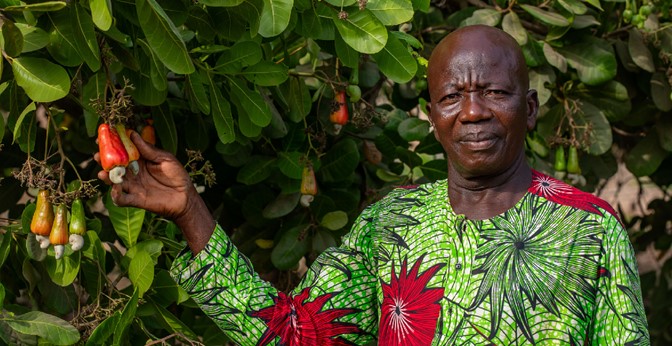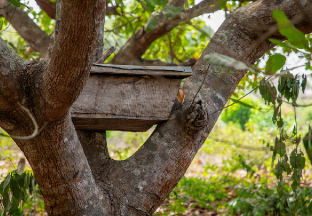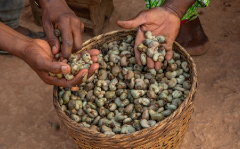Click here to download the story as a PDF


Cashew producers in the Ouémé and Plateau Departments of Benin were well aware that they could extract more value from their signature crop: the cashew nut. The farmers knew what they wanted and to get it they contacted people they knew would understand their business: fellow farmers.
Virgile-Marx Da-Dovonon, the president of the Regional Union of Cashew Nut Producers’ Cooperatives of Ouémé-Plateau, or URCPA O-P, said they had hosted U.S. Agency for International Development’s Farmer-to-Farmer, or F2F, program in the past and sought it again both for its established expertise and the way it delivers that expertise.
“They do not come to us and say, ‘We have such and such a program with you.’ No, it is we who propose, according to our strategic development plan, our needs. Farmer-to-Farmer selects a specialist, an expert in the field who comes to train us.”
The F2F volunteers responded to producer and co-op requests by introducing several concepts and methods.
Edou Evrardo, who is in charge of production at URCPA O-P, describes the four missions F2F assisted with: 1. To raise the quality and health of their cashew crops, Farmer-to-Farmer demonstrated grafting techniques. 2. To increase farm incomes while improving pollination of cashew trees, the Farmer-to-Farmer volunteer encouraged beekeeping, including how to construct better hives at a lower cost, and setting some of the hives within the orchard. 3. Farm management techniques helped streamline operations. 4. Financial audit methods offered a clear means of tracking operations and growth.
Virgile-Marx said clearer management and business objectives quickly paid off. They moved from looking outside their organization for what was available to them, to vision casters who charted their own direction. That in turn led to more business partners.
“This has allowed us to attract other partners because they have seen through this plan that we have ambitions and can do better,” Virgile says.
For their part, cashew farmers sought improved crops that would lead to better yields. They also looked at how they might improve their income stream. On the first score, they worked with Farmer-to-Farmer to build a nursery system.
David Donatien Kouakanou is a nurseryman who took what he learned about grafting and nursery management to a new level. David was an intern at URCPA-OP when the grafting assignment had been implemented. After his stay at URCPA-OP, he started his business of a cashew plant nursery.
“The way we do our grafting has changed,” David says. “The way we maintain the nursery has changed. The way we market our products has changed.”
And those changes brought impressive results. More seedlings survived, so more were sold.
“Before the training, we earned about 500,000 francs per campaign because the seedling mortality rates were so high. But today, we have progressed and per campaign we make an average of 10 million francs.”
“The way we do our grafting has changed. The way we maintain the nursery has changed. The way we market our products has changed.”
—David Donatien Kouakanou
He said improvements enabled others to get into the business as more workers were needed to handle increased production.
“It has allowed many good women who were not earning much to work with us and to earn some money,” he says, adding that the new processes are spreading to others in the industry.
“We have shared the results of this training with many people, nurserymen, producers, local people … and today there are other nurserymen who enjoy this training and who are progressing little by little in the activities like me,” David says. “The objective this year is to produce about 30,000 grafted cashew seedlings certified and sold, and also to produce other forest species that our partners need.”
Virgile-Marx Dovonou noted the dramatic change in David’s nursery business. “You can already see that this one is flying on his own wings. Thanks to this training he is now the regional president of the grafting nurserymen cooperative.”
Finally, with Benin’s cashew production season lasting only four months, producers sought ways to generate additional income. URCPA O-P saw beekeeping as a solution and their F2F volunteer, Robert Owen, had long experience with apiaries.
Hodonou D. Alphonse is a cashew producer who also raised bees. Still, his time with CRS’ F2F was fruitful.
“I’ve been a beekeeper for a long time, but I didn’t know that we could put hives in our orchards and that it would benefit our production. The volunteer taught us that,” Hodonou says.
Adding hives to his orchard had multiple positive effects. Hodonou noticed that thieves who would steal cashews would not do so with the bees present.
“The yield of nuts was low before,” he said. “We used to find six bags of nuts in this big plantation now when we installed the hives, the yield increased. If before we were harvesting 10 bags, now we have 30 bags.”
Honey production also rose.


“In the past, we found three to five liters of honey in a hive but now, even if the production is down, we can find at least 10 liters, but we can have 15 to 20 liters in a hive like this one,” Hodonou says. He also found a buyer for wax harvested from the hives.
He said honey producers now sell in groups to negotiate better prices for their product. And the quality of their honey has not gone unnoticed.
“If we are recognized today at the national and international level it is thanks to Farmer-to- Farmer,” Hodonou says.
URCPA O-P president Virgile-Marx said the improvements are obvious.
“You can already see the impact at their level and as we know, beekeeping improves not only the productivity of a plantation but at the same time the income of the producer, the welfare of the producer.”

Click here to download the story as a PDF
The CRS F2F program is a USAID-funded program focused on reducing hunger,
malnutrition, and poverty across six countries: Benin, Timor-Leste, Ethiopia, Nepal,
Rwanda, and Uganda. The program runs from 2019-2023 and aims to generate
sustainable and broad-based economic growth in the agricultural sector. U.S. volunteers
with agricultural expertise share skills and help build capacity for farmers through
short-term training and technical assistance projects resulting in more productive,
profitable, sustainable, and equitable agricultural systems.
Photos by Mountaga Drame for CRS